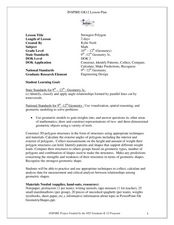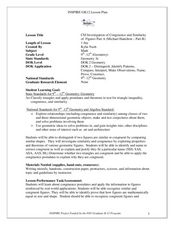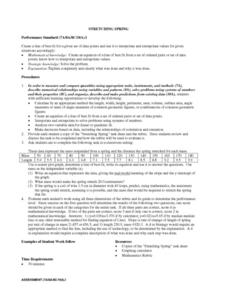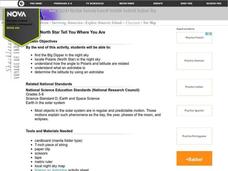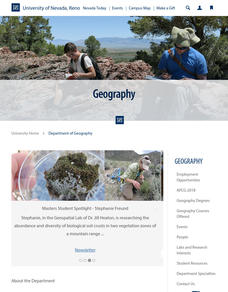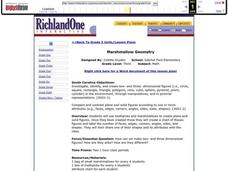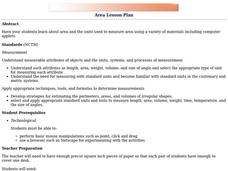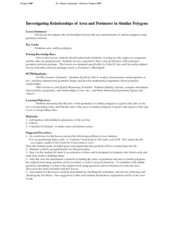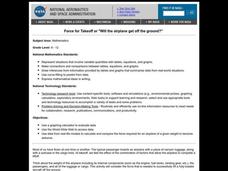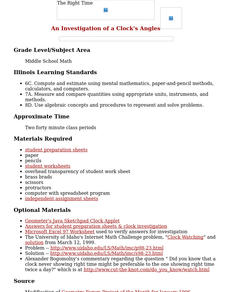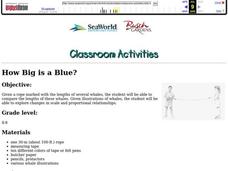Curated OER
Measuring the Earth
Young scholars identify types of arcs and angles in a circle, find the measure of arcs and angles, and solve real world problems involving lengths of segments in circles, lengths, and areas.
Curated OER
Actual Airflow vs. Ideal Airflow: Stalls
Young scholars use 3-D modeling techniques to observe the characteristic signature of the stall condition apparent on an airfoil at high angles of attack. They use FoilSim to compare the above with ideal airflow.
Curated OER
Strongest Polygon
High schoolers define and identify shapes by name. In this geometry lesson plan, students construct, identify and compare polygons based on the number of sides. They classify each shape based on their angle sum theorem.
Curated OER
CSI Investigation of Congruence and Similarity
Students differentiate between similarity and congruence using polygons. In this geometry lesson, students label triangles based on their properties. They find missing sides and angles using the interior sum theorem.
Curated OER
Pythagorean Theorem
Students solve problems using the Pythagorean Theorem. In this geometry lesson, students identify different parts of a right triangle. They use the Pythagorean Theorem to calculate missing angles and sides.
Curated OER
STRETCHING SPRING
Students calculate the length, width, height, perimeter, area, volume, surface area, angle measures or sums of angle measures of common geometric figures. They create an equation of a line of best fit from a set of ordered pairs or...
Curated OER
Triangles and Quadrilaterals
Second graders explore triangles and quadrilaterals. They rotate to various centers in the room to identify and examine triangles and quadrilaterals. After presenting a picture to the class, 2nd graders locate right angles, triangles...
Curated OER
Let the North Star Tell You Where You Are
Students participate in activities in which they find the Big Dipper and locate the North Star in the night sky, examine the relationship between the angle to Polaris and latitude, and determine latitude by using an astrolabe.
Alabama Learning Exchange
The State Capital of Stem and Leaf
Students explore the concept of stem and leaf plots. In this stem and leaf plots lesson, students plot the 50 US states' capitals on a stem and leaf plot according to the first letter of each state. Students compare their stem and leaf...
Curated OER
Circumscribed Polygons
Learners investigate polygons and construct ferris wheels. In this geometry lesson, students create a circle and differentiate properties of circles and polygons. They compare the relationship between angles and circumscribed polygons.
Curated OER
The Global Grapefruit - Representing a 3-Dimensional Globe on a 2-Dimensional Map
Students compare and contrast world maps and globes. They convert a 3-dimensional globe to a 2-dimensional map. They are introduced to the Mercator map projection. They observe map distortions of shape, area, distance, directions and angle.
Curated OER
Geometry, Measurement & Reasoning
Students complete worksheets involving rotational symmetry. In this geometry lesson, students complete worksheets to identify rotational symmetry and rotations. They compare and contrast rotated figures. Students examine the relationship...
Curated OER
Marshmallow Geometry
Third graders create 2D and 3D shapes using marshmallows and toothpicks. In this geometry lesson, 3rd graders create their shapes and document the number of faces, edges, corners, angles, and sides. They share one shape and its...
Curated OER
Studying Special Segments in Triangles
Students investigate special segments in triangles. In this geometry lesson, students graph, compare, estimate and predict findings based on their data. They differentiate between similarity and congruence of triangles.
Curated OER
Area Lesson Plan
Students explore geometry by using computer applications. In this spatial measurement lesson plan, students discuss the difference between area, weight, volume and other forms of measurement. Students utilize computer applications to...
Curated OER
Seesaws
Learners make direct comparisons between objects using balance and spring scales. They also are encouraged to estimate which object is heavier by holding the objects before using the balance scales. Comparing the masses of objects is the...
Curated OER
Saving Money Through Mathematics
Third graders discuss light sources and collect data about energy sources. They compare data and create a multiple line graph showing energy used by light sources for each student in the group. They present their graphs and write a...
Curated OER
Taller/Wider/longer
In this unit, 1st graders use measurement language and counting to compare objects in a variety of game situations. Students also practice the advanced concept of counting to advanced counting.
Curated OER
Trains
Students compare the lengths of the train through calculation. This calculation can be done by knowing the values of the rods. Students use problem solving to get the answer to the problem before them.
Curated OER
The Last Great Canal
Students read about a cholera outbreak in the 1840's. They read maps, predict how cholera moved throughout the country and participate in a lab activity that demonstrates how disease is spread. They compare cholera through time.
Curated OER
Investigating Area and Perimeter of Polygons.
Student sinvestigate the area and perimeter of polygons. They differentiate between similar and congruent polygons.. They identify the ratio and proportions of the sides and angles of polygons.
Curated OER
Math: Will The Airplane Get Off the Ground?
Students use data from real-life models to calculate and compare the force required for an airplane of a given weight to become airborne. They use a graphing calculator to evaluate data and use the World Wide Web to access data.
Curated OER
The Right Time
Students compute and estimate using mental mathematics, paper-and-pencil methods, calculators, and computers. They measure and compare quantities using appropriate units, instruments and methods. They utilize worksheets imbedded in this...
Curated OER
HOW BIG IS A BLUE?
Students compare the lengths of whales using different lengths of rope. They illustrate one whale in life-size proportion.




